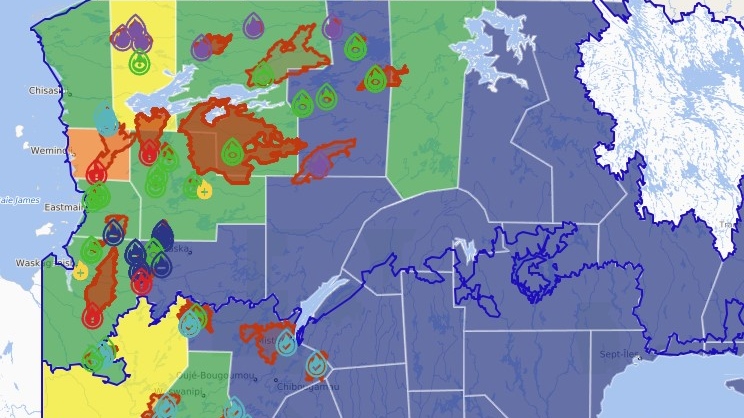Cree communities worried about Quebec wildfires' effects on trap lines, wildlife
Cree Nation of Chisasibi Chief Daisy House saw a video on social media on Thursday that reminded her that the summer's wildfires in northern Quebec are far from extinguished.
The video shows flames devouring trees mere metres from the Billy Diamond Highway, the only road accessible to House's community. It is a sight House has become accustomed to.
"It's been unprecedented, to say the least," House told CTV News. "Just watching it burn, you feel helpless, hopeless, just watching it burn."
Quebec's forest fire prevention agency (SOPFEU) reports that there are 11 fires burning in the province with four of those listed as "out of control." There have been 519 fires in Quebec, which is 150 more than the 10-year average. So far, almost 1.5 million hectares of forest have burned.
 Map of the fires burning in Quebec on Aug. 11, 2023. The ones marked red are considered 'out of control.' SOURCE: SOPFEU
Map of the fires burning in Quebec on Aug. 11, 2023. The ones marked red are considered 'out of control.' SOURCE: SOPFEU
Chisasibi is one of nine Cree communities in the Eeyou Istchee (traditional territory). All of those communities have been affected by the fires.
House said that while provincial and Cree firefighting crews have done an excellent job of protecting communities, homes and infrastructure, it is the forest — which includes traditional trap lines, cabins and camps — that have been hit particularly hard.
"We have 40 trap lines in our community just for Chisasibi alone," said House. "It's a vast territory. Eeyou Istchee is about the size of France."
House said the caretakers of the land operate in a family system and they have not been able to access their trap lines. Video footage and pictures the communities have been able to view, however, tell a bleak picture of what has happened to their territory.
"There's also the devastation of the wildlife, the water, the lakes, the fish," said House. "I spoke with one elder because I wanted to understand more of the devastation. I said, 'Is it true that the fish won't taste the same? Have you seen this in your lifetime?' And they said, 'Yes, it's going to take years to recover.'"
"And what are we talking about here? How many nests are we talking about? How many birds are we talking about? And how many cannot reproduce? One elder said I don't know if I'll see caribou in my lifetime on my trap line because of his age."
House said the food and vegetation in the area has been damaged, which will undoubtedly affect animals that Cree not only eat but also use in ceremonies.
"There's a ripple effect to the loss," she said. "We don't know what's going to grow back, how fast it's going to grow back, [or] which types of trees are going to come out first."
House hopes Canadian, and Quebec governments recognize the impact the fires have had and continue to have on Cree and other Indigenous cultures.
"I just hope that there's awareness of the devastation, just awareness education and then what it is that we can do?" she said. "Is there something that we can do to prioritize something for the land users to bring back the nature, to bring back something that they can use to sustain themselves because some of these families are hunters full time they're out on the land, that's their income.
"It's our livelihood, our lifeline, and it's part of our culture, our customs and our traditions, and I hope something can be done, maybe to supplement some of the land users that lost everything."
CTVNews.ca Top Stories

Can the Governor General do what Pierre Poilievre is asking? This expert says no
A historically difficult week for Prime Minister Justin Trudeau and his Liberal government ended with a renewed push from Conservative Leader Pierre Poilievre to topple this government – this time in the form a letter to the Governor General.
Two U.S. Navy pilots shot down over Red Sea in apparent 'friendly fire' incident, U.S. military says
Two U.S. Navy pilots were shot down Sunday over the Red Sea in an apparent 'friendly fire' incident, the U.S military said, marking the most serious incident to threaten troops in over a year of America targeting Yemen's Houthi rebels.
Ottawa MP Mona Fortier appointed chief government whip
Ottawa-Vanier MP Mona Fortier has been appointed as chief government whip, the latest addition in a major reshuffle of Prime Minister Justin Trudeau's cabinet.
opinion Tom Mulcair: Prime Minister Justin Trudeau's train wreck of a final act
In his latest column for CTVNews.ca, former NDP leader and political analyst Tom Mulcair puts a spotlight on the 'spectacular failure' of Prime Minister Justin Trudeau's final act on the political stage.
B.C. mayor gets calls from across Canada about 'crazy' plan to recruit doctors
A British Columbia community's "out-of-the-box" plan to ease its family doctor shortage by hiring physicians as city employees is sparking interest from across Canada, says Colwood Mayor Doug Kobayashi.
Bluesky finds with growth comes growing pains - and bots
Bluesky has seen its user base soar since the U.S. presidential election, boosted by people seeking refuge from Elon Musk's X, which they view as increasingly leaning too far to the right given its owner's support of U.S. president-elect Donald Trump, or wanting an alternative to Meta's Threads and its algorithms.
Big splash: Halifax mermaid waves goodbye after 16 years
Halifax's Raina the Mermaid is closing her business after 16 years in the Maritimes.
Arizona third-grader saves choking friend
An Arizona third-grader is being recognized by his local fire department after saving a friend from choking.
NASA's Parker Solar Probe aims to fly closer to the sun like never before
A NASA spacecraft aims to fly closer to the sun than any object sent before.


































